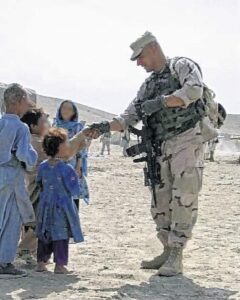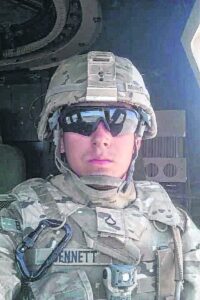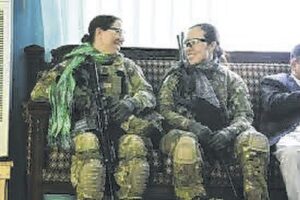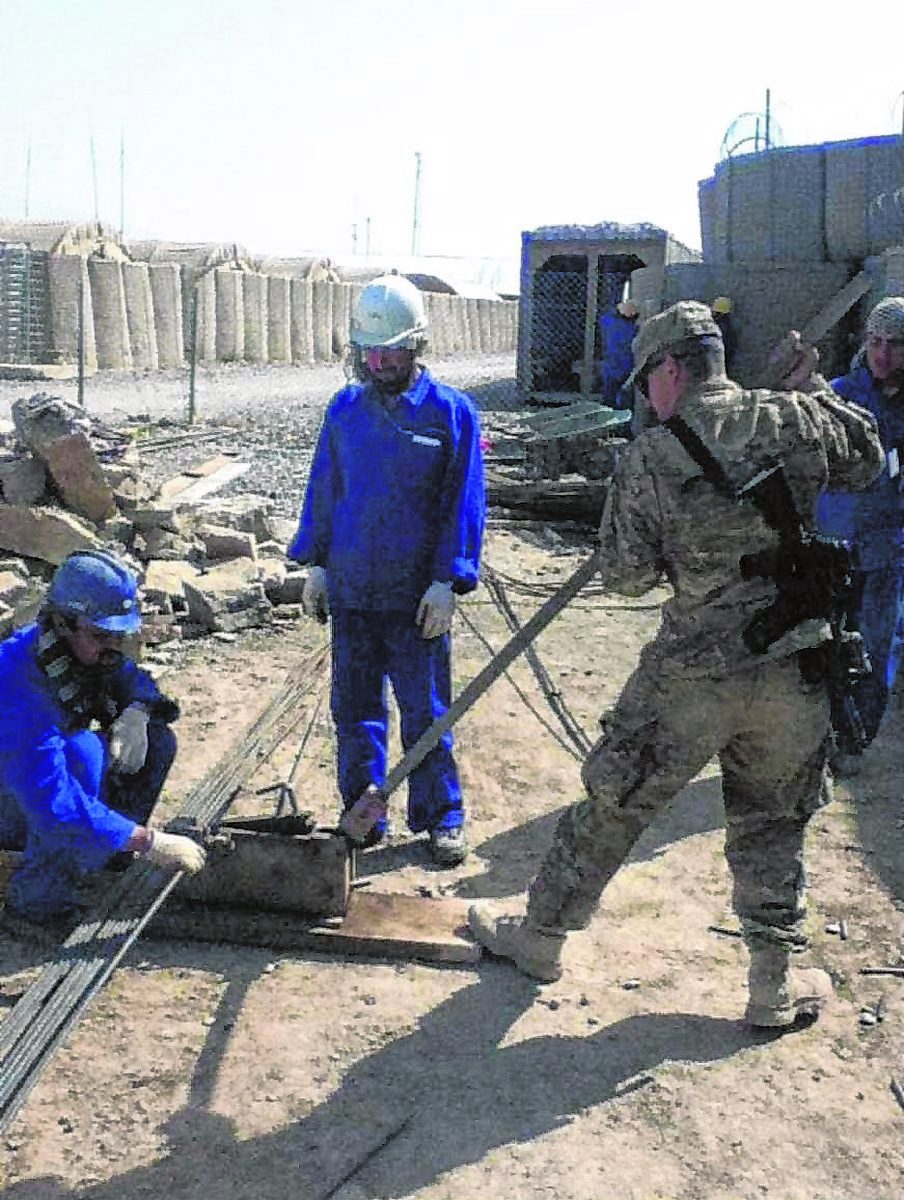America’s longest war has ended, but the way it ended is upsetting for many soldiers who put their lives on the line to root out terrorism in Afghanistan and help rebuild the country.
Local veterans recounted their service during the War in Afghanistan, and shared their thoughts about the way it ended, as the 20th anniversary of the 9/11 terror attacks approaches.
The way it ended
The War in Afghanistan accomplished its goal of finding and killing Osama bin Laden and other organizers of the terrorism group al-Qaida.
For a while, nation building efforts paid off and the people of Afghanistan experienced firsthand what it was like to live in a democracy, one where women and girls got to live out their dreams.
But just weeks before the Aug. 31 deadline President Joe Biden set to withdraw the remaining American soldiers from the Middle Eastern country, those freedoms started to crumble.
The Taliban completed a systematic, city-by-city takeover, overwhelming the Afghan troops the Biden administration had thought were ready to hold their own.
Then, on Aug. 15, the Taliban took back Afghanistan’s capital, Kabul, and the president fled the country, sealing the Taliban’s return to power.
Remaining troops in Afghanistan helped thousands of Afghans who feared retribution by the Taliban escape the country while completing the drawdown.
Just days before the last troops exited the country, on Aug. 26, two suicide bombers and gunmen of the Islamic State group attacked crowds of Afghans flocking to Kabul’s airport, transforming a scene of desperation into one of horror. The attack claimed the lives of 60 Afghans and 13 U.S. troops, including Cpl. Humberto Sanchez, a 22-year-old marine from Logansport.
The attack brought a violent end to a $2 trillion, 20-year war that, as of April, had claimed the lives of 2,448 American troops, 3,846 American contractors, 1,144 NATO allied troops, 444 aid workers, 72 journalists, 66,000 Afghan military and police officers, and 47,245 Afghan civilians.
An estimated 51,191 Taliban and other resistance fighters also lost their lives in that time period.
Americans were collectively upset about how the longest war ended, and for many different reasons.
According to a Pew Research Center poll, 54% of Americans agreed with the withdrawal of troops, but 69% of Americans thought the Biden administration handled it poorly.
Anger and sadness

Local veterans watched from Johnson County as the freedoms and progress they helped build in Afghanistan unraveled.
It was hard to see more troops killed in the 11th hour after a botched withdrawal, they said.
“A lot of guys aren’t where I am at yet. They are having a hard time wrapping their heads around it. We did these great and noble things over there, and then you so easily discard it,” retired Staff Sgt. Brian Alvey said. “This is what happens when you have men in suits making decisions that should have been made by warriors in boots.”
Thinking back on the War in Afghanistan, it looks more like 20 year-long wars than a single 20-year war to Alvey, a Franklin resident who served during the war.
He recalls helping build a school for Afghan girls during his time as a soldier, only to see it taken over by insurgents when he returned as a contractor.
“What got me was being in there in 2004 and thinking we were making a difference. Fast forward to being a contractor … It was like we were never there. We lost people here, but it was like we didn’t do anything at all,” Alvey said.
He questioned how the Biden administration could not have seen the Taliban takeover coming and the corruption inside the Afghan military that former intelligence officers saw first hand. Those oversights spelled disaster with the quick draw down, he said.
“It is difficult to talk about how we spent 20 years there, lost countless lives, lost Afghan lives and spent trillions of dollars. It is not about the money though, it is about the lives that we lost and the residuals that have been caused, like post-traumatic stress disorder,” Alvey said.
Several veterans thought the war should have ended years ago, but said the end should have been more organized. Others thought more time in Afghanistan training the troops could have brought a better end to the war, or that leaving soldiers at Bagram Air Base may have helped.

Aside from seeing the war end the way it did, local soldiers are left wondering what will happen to the Afghans who became their allies, putting their lives on the line, they said. Whether as an interpreter, police officer, soldier or construction worker, countless Afghans worked with American troops. Now, they must choose whether to resettle in the United States or risk death by staying home.
The uncertainty surrounding the Taliban takeover made Whiteland veteran Caleb Bennett remember kids — particularly a teenage father — he knew in a village where he served. Any American ally left in Afghanistan is in danger, he said.
“It is scary to think about that,” Bennett said. “One of the kids was 16 and he already had a family. Not knowing what happened or what could happen to them scares the living daylights out of me.”
With more time and a clear mission to train Afghan troops and a goal to root out corruption could have made all the difference and saved countless lives, Bennett said.
The haphazard way the mission ended makes it feel like the sacrifices made by all were in vain, he said.
Focus on what matters

Franklin veteran Sharla Stevens organized and participated in civil missions to rebuild and bring aid to Khost Province.
She worked closely with Afghans on the ground, and is heartbroken over their step backward under Taliban rule, she said. One point of comfort is knowing three interpreters she worked with are safe in the United States, she said.
The deadline and lack of readiness to withdrawal properly caused the troubling end to the war, Stevens said. But, for her, it is not a political issue. Mistakes made by both Biden and former President Donald Trump led to the situation Afghanistan is in now, she said.
Center Grove veteran Matt Limeberry, who served three tours of duty as an intelligence officer, is also troubled by the end of the war. But he tries to focus on the good that Americans were able to do, and hopes Afghans might have their freedoms back someday.
Like a patient fighting a long-term illness, the two generations of Afghans who knew freedom, might still triumph in the end, Limeberry said.

“The last 96 hours shouldn’t be how we define Afghanistan,” he said last week. “We gave girls opportunities for education, and without the war and their allyship, the special entry visas we have been able to offer would have never been offered.”
Afghanistan isn’t the first time the United States has gotten bogged down in a war, and it likely won’t be the last. It is important to understand the facts about what went wrong and learn from that, Limeberry said.
“Outside of anger and rage, they should be appreciative of the time that U.S. service members gave overseas,” he said.
Instead of focusing on the politics of the war, Stevens encourages people to understand all points of view, pray for the troops and lend a hand to Afghan refugees, especially those who settled just days ago at Camp Atterbury in southern Johnson County.
“I would like the people of Johnson County to come together in sort of solidarity … This whole thing has become so politically divisive. People are dying. It is not the time to be politically divisive,” she said. “There are a lot of ways to get involved and discover something outside of your range of learning. If you have a strong opinion why don’t you talk to someone who has a different opinion? Even if the Afghanistan war is already over, there is still a lot to do.”
The Associated Press contributed to this report.
“Share your memories”
This year marks the 20th anniversary of the Sept. 11 terror attacks. This week, the Daily Journal will publish a series of stories about 9/11, and we invite readers to share their memories about that fateful day.
Where were you that morning? What do you remember most about it? Share your stories with us in 200 words or less. We may include them in our package of coverage to be published on the anniversary Saturday.
You may email your stories to [email protected] by the end of the day today.





